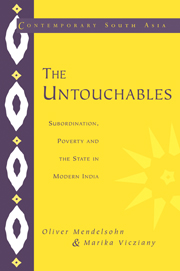Book contents
- Frontmatter
- Contents
- List of tables
- Glossary
- Preface
- 1 Who are the Untouchables?
- 2 The question of the ‘Harijan atrocity’
- 3 Religion, politics and the Untouchables from the nineteenth century to 1956
- 4 Public policy I: adverse discrimination and compensatory discrimination
- 5 Public policy II: the anti-poverty programs
- 6 The new Untouchable proletariat: a case study of the Faridabad stone quarries
- 7 Untouchable politics and Untouchable politicians since 1956
- 8 The question of reservation: the lives and careers of some Scheduled Caste MPs and MLAs
- 9 Subordination, poverty and the state in modern India
- Bibliography
- Index
1 - Who are the Untouchables?
Published online by Cambridge University Press: 05 June 2012
- Frontmatter
- Contents
- List of tables
- Glossary
- Preface
- 1 Who are the Untouchables?
- 2 The question of the ‘Harijan atrocity’
- 3 Religion, politics and the Untouchables from the nineteenth century to 1956
- 4 Public policy I: adverse discrimination and compensatory discrimination
- 5 Public policy II: the anti-poverty programs
- 6 The new Untouchable proletariat: a case study of the Faridabad stone quarries
- 7 Untouchable politics and Untouchable politicians since 1956
- 8 The question of reservation: the lives and careers of some Scheduled Caste MPs and MLAs
- 9 Subordination, poverty and the state in modern India
- Bibliography
- Index
Summary
This book is about a grouping of some 150 million people who belong to particular castes at the very bottom of Indian society. Although caste identity is the basis on which the subject has been constructed, this is only incidentally a work about caste as a cultural phenomenon. Our main preoccupations are with subordination and poverty, class, politics (including violent politics), the state and public policy. But equally, it is not possible to understand the situation of the Untouchables by exclusive reference to broad categories of analysis that treat them as simply one of many cases of subordination within India or elsewhere. The Untouchables may be capable of comparison with other social groupings but they remain a highly distinctive cultural and moral community.
Two broad propositions are fundamental to the present work. The first is that the Untouchables are among the very bottom elements of Indian society in both status and economic terms; and the second is that they have undergone a profound change in their view of themselves and the society around them. Whatever the truth of past assertions that the Untouchables accepted their own inferiority, it is our view that in recent years there has been a greatly enhanced mood of assertiveness about their human and political rights. A large part of this book will be taken up with expounding the basis of these two judgments.
But before this is done, we need to justify our construction of the subject itself. It has to be said that the basis on which this work is constructed is not currently fashionable.
- Type
- Chapter
- Information
- The UntouchablesSubordination, Poverty and the State in Modern India, pp. 1 - 43Publisher: Cambridge University PressPrint publication year: 1998



